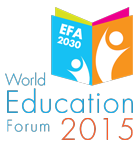INEE at the World Education Forum 2015
INEE was conceived in 2000 at the World Education Forum in Dakar, a meeting which set forth a Framework for Action and galvanized global commitment to the UNESCO-led Education for All (EFA) movement. At this meeting, UN bodies and international NGOs identified that humanitarian crises were a major obstacle to the fulfillment of the global commitment to the EFA movement. As a result, UNESCO, UNICEF, and UNHCR committed to advancing the Strategy Five of the Dakar Framework and convened the first Global Consultation on Education in Emergencies in Geneva in November 2000. Participating states, NGO representatives, and UN actors acknowledged the need to collaborate and support one another in order to see progress in the field. In early 2001, UNESCO, UNICEF, UNHCR, CARE, the International Rescue Committee, and the Norwegian Refugee Council formed the Steering Group of the INEE. INEE has since grown to a vibrant and diverse network of over 11,000 members in 170 countries.
 This week, global leaders in education, ministers, policy-makers and representatives of civil society, teacher, experts and the private sector meet again at the World Education Forum 2015, this time in Korea, to take stock of achievements and shortfalls in the implementation of the EFA goals and education-related MDGs, and to agree on a joint position for the education goal and targets in the post-2015 development agenda, which will be adopted by UN Member States at a Summit in September 2015. It is also an opportunity for the international education community to chart the way for the implementation of the Education 2030 agenda through a new Framework for Action.
This week, global leaders in education, ministers, policy-makers and representatives of civil society, teacher, experts and the private sector meet again at the World Education Forum 2015, this time in Korea, to take stock of achievements and shortfalls in the implementation of the EFA goals and education-related MDGs, and to agree on a joint position for the education goal and targets in the post-2015 development agenda, which will be adopted by UN Member States at a Summit in September 2015. It is also an opportunity for the international education community to chart the way for the implementation of the Education 2030 agenda through a new Framework for Action.
In the 15 years since the World Dakar World Education Forum in 2000, significant progress has been made in education globally, especially in terms of the number of children with access to primary education. The field of education in emergencies has been established as a defined sector of work and study, alongside a growing global awareness on the importance of education in crisis. However, progress made in achieving the EFA goals has not been equitable: it is overwhelmingly the most disadvantaged children, including those affected by conflict, crisis, and other forms of adversity, who are still left behind.
The Education 2030 agenda will not be achieved if we do not include and prioritize the millions of learners affected by crisis and conflict and ensure that the new framework for action is robust enough to meet the rights and needs of all learners. This is a critical moment for the education in emergencies community to contribute to this important global conversation. As INEE Steering Group co-chairs, Marina Anselme (RET) and Joel Reyes (World Bank) wrote earlier this year, “As we [the INEE network] have achieved our initial role of making education in emergencies central to humanitarian and development discussions, our future contributions are ever more important and crucial to guarantee that this central position is followed by financial, technical, and policy structures and resources.”
In this effort, INEE has organized an online Global Consultation on EiE (14-22 May 2015) as well as an in-person consultation at the World Education Forum to amplify the knowledge and experience within the INEE membership on how to better support and finance education in emergencies. The findings from this consultation will inform the outcomes at the Oslo Summit of Education for Development (6-7 July).
Click to see a full list of EiE-related events at the World Education Forum.



